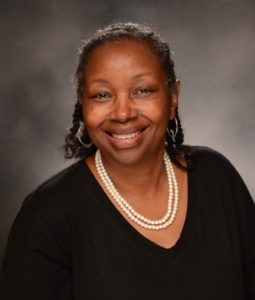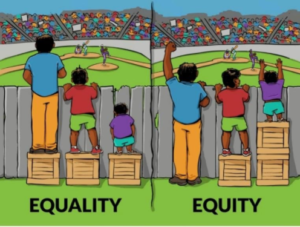Ready,Set, ZOOM: Adult Education Takes off Focused on Providing Equity Above Equality

“The stakes are too high — for our children, for our economy, for our country. It’s time for all of us to come together — parents and students, principals and teachers, business leaders and elected officials — to end America’s dropout crisis.”
— B. Obama (2010, unpaged)
by Fontaine M. Ferebee-Johns
As adult educators maneuvering our way through meeting the needs of adult learners from diverse backgrounds in the midst of a pandemic, it is vital that we also remain focused on the challenge of assuring equality and equity, along with knowing the difference between the two. Just as there are six letters in one term and eight in the other, when placed alongside equity, equality falls short where systemic injustices are in operation. The terms equality and equity are often used synonymously. Conversely, they differ in essential ways.
Equality, more often than not, is defined as treating everyone the same and giving everyone access to the identical opportunities without considering individualized need. Equality a neutralizer in the aspects of society whereby diversity or inclusiveness have been out of reach or distant and where being separate is better served.
Equity refers to proportional representation (by race, class, gender, etc.) in those same opportunities, while taking into consideration what an individual needs. Equity is a step in the right direction, but its reach may fall short if the gap it is intended to bridge goes unrealized. The achievement of equity, policies and procedures may result in an unequal distribution of resources. As evidenced by the illustration that follows, equality is an even distribution of resources versus equity being the distribution of resources as needed.
|
|
|---|
|
Note. Equality vs. Equity [Image], by Interaction when entering adult education. For example, Institute for Social Change, Artist: Angus Maquire, |
According to the National Policy Board for Educational Administration (NPBEA) (2005), effective educational leaders act as agents of continuous improvement, striving for equity of educational opportunity and culturally responsive practices to promote each student’s academic success and well-being. Further, “the exploration of new understandings, the synthesis of new information, and the integration of these insights throughout professional spheres can lead future educational leaders to a broader, more inclusive approach in addressing issues of student learning and equity” (Brown-Ruzzi, 2006, p. 703).
Not every student walking into an adult education program is prepared to work towards earning a high school credential. With this in mind, it becomes the primary focus of adult education leaders, in collaboration with teachers and staff, to assure that every student has an educational plan that is equitable and goal-inspired for postsecondary education or employment. Statistically, African American and Hispanic students have a more difficult time meeting with success in a traditional high school with nearly 40% failing to complete high school in three years. This rate is almost 15% higher than their Caucasian counterparts (Blankstein et. al., 2016). Thus, it is crucial that adult education programs take the extra steps to make certain that students from diverse backgrounds and cultures have positive educational experiences that promote equity Note. Equality vs. Equity [Image], by Interaction when entering adult education. For example, educators should enact ways to reassure students that their traditional high school experiences are behind them. This assurance can be achieved by adhering to the following components during the student orientation process.
- Learning is accomplished at their own pace.
- There are no pre-set completion dates.
- There is no competition between peers for class rank and position.
Adult educators must be Ready and Set to Zoom into the principle of placing EQUITY above Equality when assisting adult learners setting educational and postsecondary goals. This assistance comes when adult educators see adult learners as individuals or various colors, races, genders, socioeconomic classes, cultures, ethnicities, etc. all having their own unique stories that must be heard to promote their journeys towards becoming lifelong learners.
Step Into the 4th Box
Continue the story of these two equality & equity further to the third, liberation, and beyond with free DEI tools and resources from the Center for Story-Based Strategy. Access images, teaching tools, and learning materials designed to help DEI learners explore, assess, vision, and pursue DEI goals in order to produce outcomes both personally and professionally.
References
Blankstein, A. M., Noguera, P., & Kelly, L. (2016). Excellence through equity: Five principles of courageous leadership to guide achievement for every student. ASCD.
Brown-Ruzzi, B. (2006). Academic programs in alternative education: An overview. National Center on Education and the Economy. National Policy Board for Educational Administration (NPBEA). (2015). Professional standards for educational leaders 2015. https://www.wallacefoundation.org/knowledge-center/Documents/Professional-Standards-forEducational-Leaders-2015.pdf
National Policy Board for Educational Administration (NPBEA). (2015). Professional standards for educational leaders 2015. https://www. wallacefoundation.org/knowledge-center/ Documents/Professional-Standards-for- Educational-Leaders-2015.pdf
Obama, B. (2010). President Obama announces steps to reduce dropout rate and prepare students for college and careers. The White House, Office of the Press Secretary. https://obamawhitehouse. archives.gov/the-press-office/president-obamaannounces-steps-reduce-dropout-rate-andprepare-students-college-an
 Dr. Fontaine M. Ferebee-Johns holds a B.S. in sociology from Virginia Union University, an M.A. in severe disabilities from Norfolk State University, an Ed.S. from Old Dominion University, and an Ed.D, from Virginia Polytechnic Institute and State University (Virginia Tech). Dr. Ferebee-Johns is employed with Chesapeake Public Schools and has served in the capacity of special education teacher focusing on students living with autism, Coordinator for Adult Education, and is currently Supervisor/Program Administrator for Adult Education. Her professional memberships include the National Education Association, the Chesapeake Education Association, the Association for Supervision and Curriculum Development, Virginia Association for Adult and Continuing Education (VAACE), and the Coalition on Adult Basic Education (COABE). Community service affiliations for Dr. FerebeeJohns include memberships with First Baptist Church South Hill, Alpha Kappa Alpha Sorority Inc., Virginia Union University National Alumni Association, the Urban League of Hampton Roads, and the NAACP.
Dr. Fontaine M. Ferebee-Johns holds a B.S. in sociology from Virginia Union University, an M.A. in severe disabilities from Norfolk State University, an Ed.S. from Old Dominion University, and an Ed.D, from Virginia Polytechnic Institute and State University (Virginia Tech). Dr. Ferebee-Johns is employed with Chesapeake Public Schools and has served in the capacity of special education teacher focusing on students living with autism, Coordinator for Adult Education, and is currently Supervisor/Program Administrator for Adult Education. Her professional memberships include the National Education Association, the Chesapeake Education Association, the Association for Supervision and Curriculum Development, Virginia Association for Adult and Continuing Education (VAACE), and the Coalition on Adult Basic Education (COABE). Community service affiliations for Dr. FerebeeJohns include memberships with First Baptist Church South Hill, Alpha Kappa Alpha Sorority Inc., Virginia Union University National Alumni Association, the Urban League of Hampton Roads, and the NAACP.
